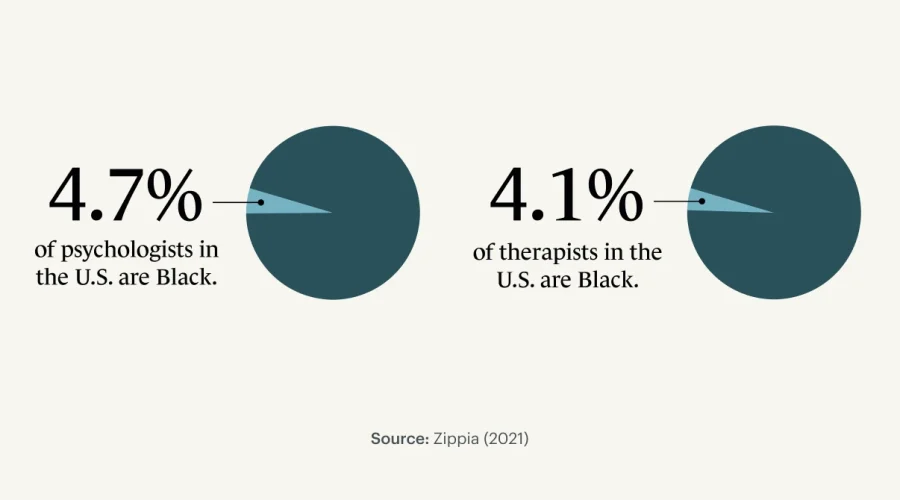Stigmatizing Mental Illness continues to be prevalent in communities of color. For minorities, psychological stress, anxiety, depression, and post-traumatic stress disorder are common mental health issues. The first statement may hold some truth, but the latter two could be easily recognized as gaslighting or dismissing a request for help. In addition to other prevalent mental health challenges like depression, bereavement, anxiety, ADHD, marital issues, and stress, therapists play a vital role in helping minorities cope with and recover from racial stress, trauma, and post-traumatic stress disorder (PTSD).”

Why we need more Black therapists
Black therapists are essential for improving mental health in Black communities. Their cultural understanding allows them to address issues like racism and microaggressions effectively. Shared experiences foster trust and a safe space for clients to express themselves freely. Black therapists also challenge stigmas by demonstrating success in mental health, encouraging help-seeking behavior. Increased representation makes therapy more accessible, leading to earlier intervention and better overall mental health outcomes for Black clients. A more diverse mental health field with a strong presence of Black therapists is vital for dismantling barriers and ensuring culturally competent care for Black communities.
Student Training Program Overview
Our student training program offers an immersive learning experience for master’s level students working to complete their education in mental health fields. By participating in this program, students gain valuable clinical experience under the mentorship of seasoned professionals like Ms. Lynch. The curriculum is enriched with a focus on integrating health and behavioral health, reflecting the latest advancements and best practices in the field. This approach not only prepares students for the complexities of modern mental health challenges but also instills in them a holistic understanding of patient care.
Impact on the Mental Health Marketplace
The ultimate goal of our student training program is to significantly increase the number of qualified mental health practitioners in the marketplace. By equipping students with the skills, knowledge, and experience needed to excel in their careers, we aim to address the pressing demand for mental health services across communities. Our program serves as a critical pipeline, fostering the development of competent, compassionate, and innovative mental health professionals ready to make a difference.
Medicaid Contract Achievement
In recognition of our commitment to excellence and the effectiveness of our programs, The International Center for Wellness has been awarded a Medicaid contract through the tailored plan in the state of North Carolina. This contract signifies a major milestone in our efforts to expand access to mental health services, particularly for underserved populations. It allows us to leverage additional resources to enhance our training program and extend our reach to more individuals in need of mental health support.
Student List
Invitation for Support and Collaboration
As we celebrate this achievement and look to the future, we are actively seeking the support and collaboration of funders and partners who share our vision of a more accessible and effective mental health care system. With the backing of our community and stakeholders, we can continue to innovate, expand, and improve the lives of those we serve.
Together, we can build on the success of our student training program and Medicaid contract to make a lasting impact on the mental health marketplace. We invite you to join us in this important work, supporting our mission to train the next generation of mental health practitioners and expand access to quality mental health care for all.












